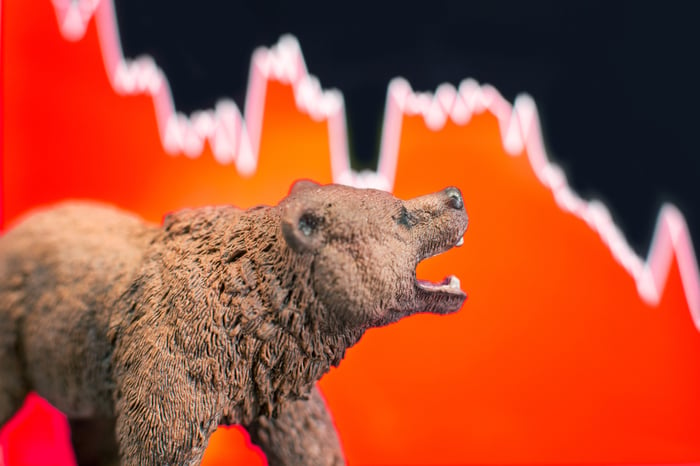When examined over multiple decades, it's evident that Wall Street is a wealth-creating machine. But getting from point A to point B on Wall Street doesn't occur in a straight line. Stock market corrections and bear markets are a natural part of the long-term investing cycle.
Last year, we witnessed all three major U.S. stock indexes plummet into bear markets, with the growth-driven Nasdaq Composite (^IXIC 2.02%) bringing up the caboose: a 33% decline. In 2023, the Nasdaq has done a complete 180, with the index higher by more than 36% year to date through the closing bell on Aug. 1.

Image source: Getty Images.
Yet even with its stellar recent performance, the Nasdaq Composite still sits more than 11% below its all-time closing high set in November 2021. For opportunistic growth-stock investors, it means bargains can still be found.
What follows are four unmatched growth stocks you'll regret not buying in the wake of the Nasdaq bear market dip.
Sea Limited
The first one-of-a-kind growth stock that's screaming to be bought by opportunistic investors is Singapore-based Sea Limited (SE 0.05%). Although the company's gaming segment has experienced a decline in active users with the worst of the pandemic now in the rearview mirror, the long-term outlook for all three of Sea's core segments is pointing higher.
For instance, even though the number of quarterly paying users for Garena (the aforementioned gaming segment) dropped to 7.7% of its active mobile gamers in the March-ended quarter from 9% in the year-ago quarter, this 7.7% pay-to-play ratio is still many multiples higher than the industry average. The company's mobile games, including Free Fire, continue to resonate with users who are, ultimately, opening their wallets.
We're also seeing plenty of momentum from Sea's digital financial services segment, SeaMoney. Tens of millions of people are taking advantage of the company's mobile wallet. Given that many of the countries Sea operates in are underbanked, SeaMoney could be a serious cash-flow driver by the midpoint of the decade.
But the top growth catalyst for Sea Limited looks to be its e-commerce platform, Shopee. The company's e-commerce turnaround has been eye-popping, with nearly $208 million in earnings before interest, taxes, depreciation, and amortization (EBITDA) in the March-ended quarter after reporting negative $743 million in EBITDA for Shopee in the year-ago period. Sustained double-digit sales growth should be the expectation at this point.
With earnings per share expected to double between 2023 and 2026, according to Wall Street, Sea has the look of a smart buy for patient investors.
Lovesac
A second unmatched growth stock that you'll be kicking yourself for not buying in the wake of the Nasdaq swoon is The Lovesac Company (LOVE -0.05%). Though just saying the phrase "furniture stock" is enough to put die-hard investors to sleep, I assure you that Lovesac is nothing like the traditionally slow-growing, stodgy furniture industry.
The first big difference you'll note between Lovesac and its peers is the furniture. Nearly 90% of the company's net sales comes from "sactionals," which are modular couches that buyers can rearrange dozens of ways to fit most living spaces. Sactionals have more than 200 different cover choices, which all but ensures that any color scheme or theme for a home can be matched. And they can be upgraded to include surround sound, wireless charging stations, or both.
But what really sets Lovesac's furniture apart is that its yarn is made from recycled plastic water bottles. The average sactional will repurpose 966 bottles. The eco-friendly aspect of Lovesac's furniture, coupled with its optionality and functionality, makes it unique.
Something else that helps Lovesac stand out is its omnichannel sales platform. Whereas most furniture retailers rely on foot traffic into their brick-and-mortar stores to drive sales, Lovesac has an assortment of revenue channels, including direct-to-consumer, pop-up showrooms, and brand-name partnerships, to go along with its physical footprint. Lessening its reliance on its physical stores has helped reduce its overhead expenses and pushed the company to recurring profitability well ahead of Wall Street's expectations.
A forward price-to-earnings ratio of 10 for an innovator with a double-digit sales growth rate is criminally inexpensive.

Image source: Getty Images.
Fiverr International
The third unrivaled growth stock you'll regret not scooping up after the Nasdaq plunge is online-services marketplace Fiverr International (FVRR 3.74%). While rumblings of a recession could derail near-term momentum for the job market, a trio of catalysts have Fiverr perfectly positioned for the future.
The first factor working in Fiverr's favor is the permanent shift we've witnessed in the labor market following the worst of the pandemic. Though some people have returned to the office, more workers than ever before are staying remote. That's precisely what you'd want to see for a company whose online platform is designed to connect freelancers with businesses.
Fiverr's online platform provides a second key differentiator that's been pivotal to its success. While most competing online marketplaces price freelancer services by the hour, Fiverr freelancers are pricing their jobs as a complete task. That superior price transparency has led buyers to spend more on an annual basis.
But the factor that really makes Fiverr International a phenomenal buy is its take rate: the percentage of each negotiated deal it gets to keep, inclusive of fees. Its take rate expanded to 30.4% during the March-ended quarter, which is nearly double that of Upwork, its closest competitor. To put this another way, Fiverr is progressively collecting more from freelancers and buyers, yet it's seeing the aggregate number of freelancers and buyers on its platform grow over time.
With shares of Fiverr trading at a historically low multiple of 15 times forward earnings, now is the ideal time to pounce.
Alphabet
The fourth unmatched growth stock you'll regret not buying in the wake of the Nasdaq bear market is none other than FAANG stock Alphabet (GOOGL 10.22%) (GOOG 9.96%), the parent company of internet search engine Google and streaming platform YouTube.
Though Alphabet's ad-driven operating model has been adversely affected by recessionary fears over the past couple of quarters, its competitive advantages and well-defined catalysts are firmly intact.
Before digging in, keep in mind that advertising-driven businesses have a numbers game working to their advantage. Even though recessions are an inevitable part of the economic cycle, periods of expansion last considerably longer. In short, Alphabet is going to possess exceptional ad-pricing power more often than not.
Its foundational operating segment continues to be Google. Based on data from GlobalStats, Google accounted for more than 92% of worldwide internet search in July 2023. In fact, Google hasn't tallied less than a 90% share of global internet search since March 2015. Having a practical monopoly on internet search makes it the logical choice of advertisers and further boosts its ad-pricing power.
But what really has long-term investors intrigued is Alphabet's two fast-growing ancillary segments. YouTube is the second most-visited social site globally. And Google Cloud is the world's No. 3 cloud infrastructure service provider. The latter is particularly intriguing given that it has delivered two consecutive quarters of operating profits after years of losses. Sooner than later, it would not be shocking to see Google Cloud become a major contributor to Alphabet's annual cash flow.
Even after rallying strongly from its 2022 bear market low, Alphabet remains historically inexpensive. Though it has averaged a price-to-cash-flow ratio of 18.2 over the trailing five years, investors have the opportunity to buy shares right now for less than 14 times consensus forward-year cash flow. That's quite the bargain for an undisputed industry leader.





